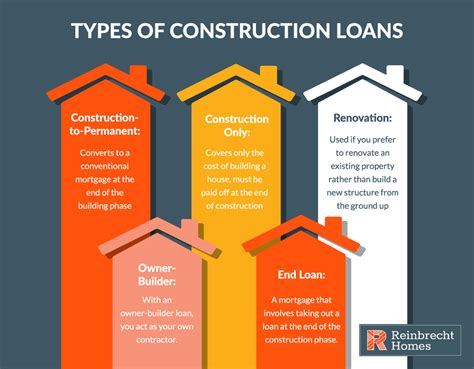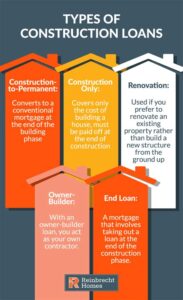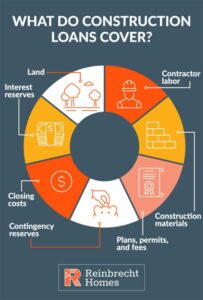
Navigating the world of construction loans can seem daunting, but understanding the process is key to securing the best rates. Whether you’re planning to build your dream home, expand your business, or undertake a renovation project, getting approved for construction loan rates involves several critical steps.
From comprehending the intricacies of loan approval to gathering essential documents and evaluating your financial health, each stage plays a significant role in your journey. In this article, we’ll demystify the construction loan approval process, explore the key factors influencing rates, and provide you with practical tips to enhance your chances of a successful application. Join us as we guide you through the crucial steps to make your construction financing experience as seamless as possible.
Understanding The Process Of Construction Loan Approval
To successfully navigate The Process of construction loan approval, it’s essential to understand the various stages involved. The approval process typically begins with your lender assessing your financial profile, which includes your credit score, income, and existing debts. This preliminary step helps them determine your eligibility for a construction loan.
Once you have gathered the necessary documents and submitted them, the lender will conduct a thorough review, focusing on the specifics of your construction project. This includes examining the project plans, estimated costs, and the timeline for completion. They may also require an appraisal of the land or property to ensure its value supports the loan amount requested.
After all the paperwork has been reviewed, and if everything is in order, the lender proceeds with underwriting. During this phase, they analyze the risk factors associated with the loan and verify that you meet their lending criteria. Approval at this stage may lead to a conditional approval, which will specify any additional requirements before fully funding the loan.
Upon meeting all conditions set forth by the lender, you will receive your loan approval. Understanding The Process can help streamline your experience and minimize potential delays. Being proactive about preparing for each step can significantly increase your chances of obtaining favorable terms on your construction loan.
Gathering Necessary Documents For The Approval Process
To navigate The Process of obtaining construction loan approval, one of the most critical steps is to gather all necessary documents. Having the right paperwork ready can streamline the approval process and increase your chances of securing favorable loan terms.
Here are the essential documents you should compile:
- Personal Identification: A government-issued ID, such as a driver’s license or passport, to verify your identity.
- Social Security Number: Required for credit checks and verification.
- Income Verification: Recent pay stubs, tax returns, and W-2 forms from the last two years to demonstrate your earnings and employment stability.
- Bank Statements: Provide statements for the last three to six months to show your savings and financial habits.
- Construction Plans: Detailed blueprints or plans for the property you intend to build, including the estimated budget.
- Property Appraisal: A professional appraisal report to evaluate the value of the land or property to be constructed.
- Credit History: Lenders will typically pull your credit report, but having your credit score and history readily available can facilitate discussions.
- Builder Credentials: Documentation proving the builder’s qualifications, including licenses and insurance to ensure they are reputable and able to take on the project.
By ensuring you have these documents organized and readily available, you can make The Process of construction loan approval smoother and more efficient, allowing for quicker decision-making from lenders.

Evaluating Your Financial Health Before Applying
Before embarking on The Process of securing a construction loan, it is crucial to assess your financial health. Understanding where you stand financially will help you determine your eligibility and prepare for the approval process. Here are some key aspects to consider:
- Credit Score: Your credit score plays a significant role in obtaining a favorable construction loan rate. Lenders typically look for a score of 680 or higher. Obtain a copy of your credit report to review any discrepancies and address them ahead of time.
- Debt-to-Income Ratio: This ratio measures your total monthly debt payments against your gross monthly income. Lenders prefer a debt-to-income ratio below 43%. Calculate this ratio to ensure you meet this criterion.
- Income Stability: Lenders will evaluate your employment history and income stability. Having a consistent and reliable source of income will strengthen your application. If you have recently changed jobs or sources of income, be prepared to explain these changes.
- Assets and Reserves: Having liquid assets can enhance your financial profile. Lenders may require you to show that you have sufficient reserves to cover several months’ worth of mortgage payments, especially during the construction phase.
- Down Payment: A substantial down payment can also influence the loan terms you receive. Aim to save at least 20% of the total construction cost, as this may lead to lower interest rates and better loan conditions.
By thoroughly evaluating these aspects of your financial health, you’ll be better positioned to navigate The Process of getting approved for construction loan rates and ultimately secure financing for your project.
Key Factors Influencing Construction Loan Rates
When navigating The Process of securing a construction loan, understanding the key factors that influence loan rates is crucial. Construction loan rates can vary significantly based on several criteria, including but not limited to the following:
- Credit Score: Lenders assess your creditworthiness through your credit score. A higher score often leads to more favorable rates, while a lower score may increase your rate and/or require additional conditions.
- Down Payment: The size of your down payment can impact your loan rate. Generally, a larger down payment reduces lender risk, potentially leading to lower rates.
- Loan Term: The duration of the loan can affect the interest rate as well. Shorter-term loans may come with lower rates compared to longer-term options due to reduced risk for the lender.
- Loan-to-Value Ratio (LTV): Lenders calculate the LTV ratio by comparing the loan amount to the property’s appraised value. A lower LTV ratio generally results in better rates, as it demonstrates less risk for the lender.
- Loan Type: Fixed-rate loans usually come with different rates compared to adjustable-rate mortgages (ARMs). Understanding the distinctions and your financial stability can guide you to the right choice.
- Market Conditions: Economic factors, such as prevailing interest rates and the demand for loans, can substantially influence construction loan rates. Staying informed about market trends can help you time your application wisely.
- Type of Construction: Whether you are building a new home, undertaking a renovation, or a commercial project may affect interest rates. Some lenders may offer different terms based on the specific type of construction.
Being aware of these factors and how they relate to The Process of loan approval can empower you to make informed decisions and potentially secure better loan rates.

Final Steps To Secure Your Construction Loan Approval
After navigating the earlier stages of the loan application process, you are now approaching the final steps to secure your construction loan approval. These crucial actions will determine how smoothly the closing process goes and ultimately how quickly you can begin your construction project.
1. Review Your Loan Agreement: Once the lender has completed their assessment, they will present a loan agreement. Take this time to thoroughly review all terms, interest rates, and payment schedules. Ensure that you understand every detail, as this is a legally binding document.
2. Undergo a Final Credit Check: Lenders may perform a final credit check before granting approval. Be prepared for this by ensuring your financial situation remains stable and that you avoid any significant new debts.
3. Secure Insurance: Most lenders will require proof of insurance before final approval. You will need to secure construction insurance and possibly liability insurance to protect against any potential risks that arise during the building process.
4. Finalize Your Construction Plans: Make sure all your construction plans and permits are finalized prior to the funding phase. This includes confirming that your contractor is ready to begin and that all necessary documentation is in place.
5. Attend the Closing Meeting: Finally, you will need to attend a closing meeting where all parties involved will sign the loan documents. During this meeting, be prepared to provide any last-minute information and ask questions regarding aspects of the loan that may still be unclear.
Completing these steps can significantly streamline the process of getting your construction loan approved. Keeping communication open with your lender throughout ensures that you are well-informed and ready to move forward with your construction project.

Frequently Asked Questions
What is a construction loan?
A construction loan is a short-term loan used to finance the building or renovation of a property. It typically covers the cost of materials, labor, and other expenses related to construction.
What are the typical requirements for getting approved for a construction loan?
Typical requirements include a good credit score, a detailed construction plan, proof of income, a sufficient down payment, and sometimes, a higher debt-to-income ratio.
How do construction loan rates compare to traditional mortgage rates?
Construction loan rates are generally higher than traditional mortgage rates because they are considered riskier; lenders have less assurance that the project will be completed on time and within budget.
What documents are needed to apply for a construction loan?
Applicants usually need to submit a loan application, detailed project plans, a budget breakdown, personal financial statements, and proof of ownership or purchase of the land.
How long does the approval process for a construction loan typically take?
The approval process for a construction loan can take anywhere from a few weeks to over a month, depending on the lender and the complexity of the project.
Are there any special considerations for self-builders when applying for a construction loan?
Yes, self-builders may face additional scrutiny as lenders often require a higher level of detail in plans and may prefer applicants who have prior construction experience.
What can borrowers do to improve their chances of getting approved for a construction loan?
Borrowers can improve their chances by ensuring their credit is in good shape, providing a solid and realistic construction plan, demonstrating stable income, and maintaining low debt levels.

Leave a Reply